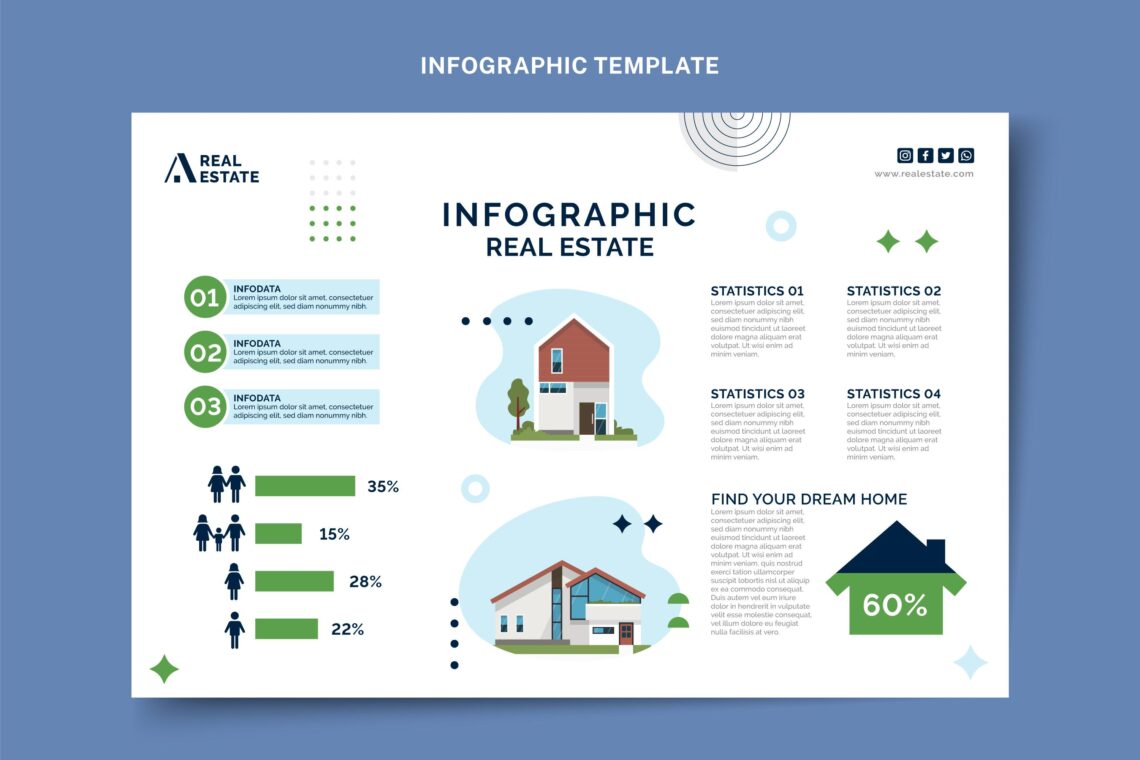
Real Estate Tips for First-Time Buyers: Your Ultimate Guide
Introduction
Buying your first home is an exciting milestone, but it can also be an overwhelming process filled with numerous challenges. From financial considerations to the complexities of the real estate market, first-time buyers often face a steep learning curve. This real estate tips guide aims to provide practical tips to make your journey smoother and help you navigate this significant life decision with confidence.
Understand Your Financial Situation
Assess Your Finances
Before diving into the home-buying process, it’s crucial to have a clear understanding of your financial health. This involves evaluating your savings, income, and existing debt. Knowing where you stand financially will help you set realistic expectations and avoid overextending yourself.
Case Study: John and Sarah, a young couple, took a year to save diligently and paid off significant portions of their credit card debt. By doing so, they were able to set a clear budget and avoid future financial strain.
Budgeting for a Home
Creating a realistic budget is essential. Think through all the expenses of purchasing a house—down payment, closing fees, relocation charges, and any quick repairs or renovations. Use a home affordability calculator to get a better idea of what you can afford.
Credit Score
Your credit score plays a pivotal role in securing a mortgage with favorable terms. A higher credit score can lead to lower interest rates, saving you thousands of dollars over the life of the loan. If your credit score needs improvement, focus on paying down debt, avoiding new credit inquiries, and correcting any errors on your credit report.
Get Pre-Approved for a Mortgage
Pre-Approval vs. Pre-Qualification
Key is to know the differences between pre-qualification and pre-approval. Pre-qualification gives you an estimate of how much you might be able to borrow, while pre-approval is a more rigorous process that verifies your financial information and provides a specific loan amount.
Real-Life Example: Lisa, a first-time homebuyer, got pre-approved for a mortgage. This gave her the confidence to make competitive offers and speed up the closing process when she found her dream home.
Choosing the Right Lender
Shop around for a mortgage lender that offers the best rates and terms. Don’t be afraid to compare offers from multiple lenders to find the one that suits your needs.
Understanding Mortgage Options
Familiarize yourself with different types of mortgages:
- Fixed-Rate Mortgages offer a consistent interest rate and monthly payment.
- Adjustable-Rate Mortgages (ARMs) start with a lower rate that can change over time.
- FHA Loans are government-backed loans that are ideal for buyers with lower credit scores or smaller down payments.
Determine Your Must-Haves and Deal Breakers
List of Priorities
Create a list of essential features and nice-to-haves in your new home. This list should include factors like the number of bedrooms, bathrooms, and square footage, as well as any specific amenities you desire.
Future Needs
Consider your future needs as well. Are you planning to expand your family? Will you need a home office? Thinking ahead will help you choose a home that accommodates your long-term goals.
Case Study: Emily and James made a list of their must-haves and deal-breakers, which guided them in finding a home that met their immediate needs and had room for future growth.
Research Neighborhoods
Location Matters
Choosing the right neighborhood is just as important as selecting the right home. Consider factors like proximity to work, schools, and amenities when researching neighborhoods.
Community and Amenities
Look for communities that offer the amenities you value, such as parks, restaurants, and shopping centers. Safety and local crime rates should also be considered.
Market Trends
Research market trends in different areas to understand property values and potential for appreciation. Websites like Zillow and Redfin offer insights into market trends and neighborhood statistics.
Work with a Real Estate Agent
Finding a Good Agent
A reputable real estate agent can be an invaluable resource. Seek recommendations from friends, family, or online reviews to find an agent with a proven track record.
Agent’s Role
An experienced agent will assist you in finding listings that meet your criteria, negotiating offers, and navigating the complexities of the closing process.
Communication
Clear communication with your agent is vital. Ensure they understand your needs and preferences, and keep an open line of communication throughout the home-buying process.
Start the Home Search
Online Tools
Use popular websites and apps like Zillow, Realtor.com, and Redfin to browse listings and save your favorites. These platforms often offer advanced search filters to help you narrow down your options.
Open Houses
Attend open houses to get a firsthand look at potential homes. Take notes, photos, and ask questions about the property and neighborhood.
Home Inspections
A thorough home inspection is critical to uncover any potential issues with the property. Hire a professional inspector and review the findings carefully to make an informed decision.
Make an Offer
Offer Strategy
Making a competitive offer requires research and strategy. Work with your real estate agent to determine a fair offer based on comparable properties and current market conditions.
Real-Life Example: Mike and Laura made an offer on a home that had been on the market for a while. By offering slightly below asking price but adding favorable terms, they successfully negotiated a great deal.
Negotiations
Be prepared for negotiations. Stay flexible and be willing to compromise on certain aspects to reach an agreement with the seller.
Contingencies
Include common contingencies in your offer, such as inspection and financing contingencies, to protect yourself in case any issues arise.
Closing the Deal
Understanding the Closing Process
The closing process involves several steps, including a title search, finalizing your mortgage, and signing legal documents. Understanding these steps will help you prepare and avoid delays.
Paperwork
Review all paperwork carefully before signing. Ensure everything is accurate and ask questions if you don’t understand any part of the process.
Final Walkthrough
Conduct a final walkthrough of the property before closing to ensure it’s in the agreed-upon condition and any requested repairs have been completed.
Moving In
Planning Your Move
Organize your move efficiently by creating a moving checklist, hiring a reputable moving company, and packing systematically.
Setting Up Utilities
Set up essential services like electricity, water, gas, internet, and cable before moving in to ensure a smooth transition.
Home Maintenance
Regular home maintenance is key to preserving your investment. Create a maintenance schedule for tasks like cleaning gutters, servicing HVAC systems, and checking for leaks.
Conclusion
Buying your first home is a significant achievement, and taking the time to understand each step of the process can make it more manageable. Remember to assess your finances, get pre-approved, work with a trusted real estate agent, and carefully consider your needs and preferences. By doing so, you’ll be well-equipped to find a home that meets your needs and brings joy for years to come.
Embark on this journey with confidence, and don’t hesitate to seek professional advice when needed. Happy homebuying!





